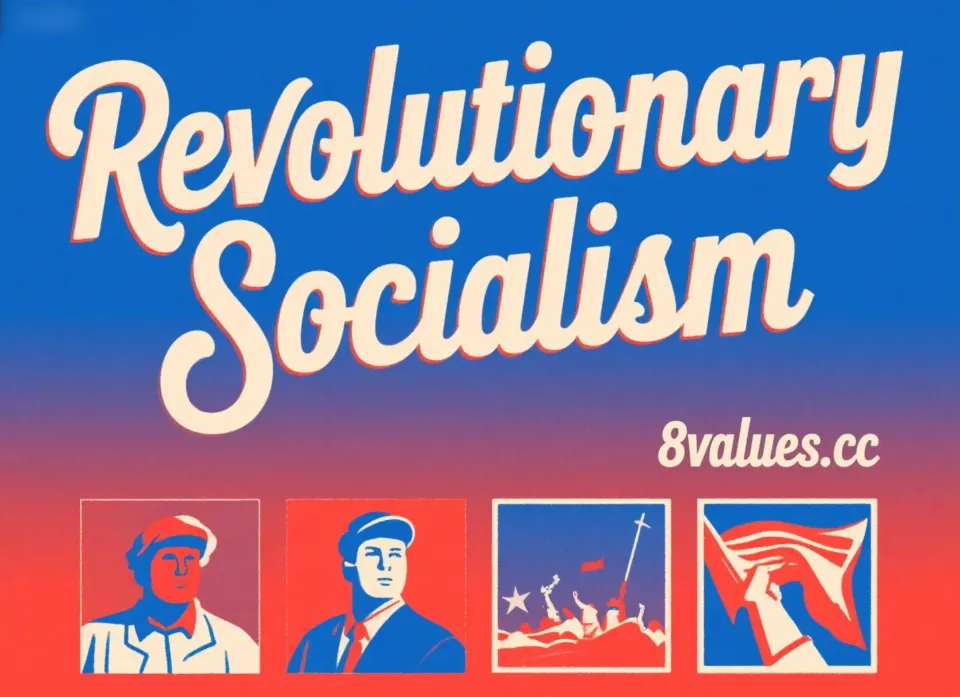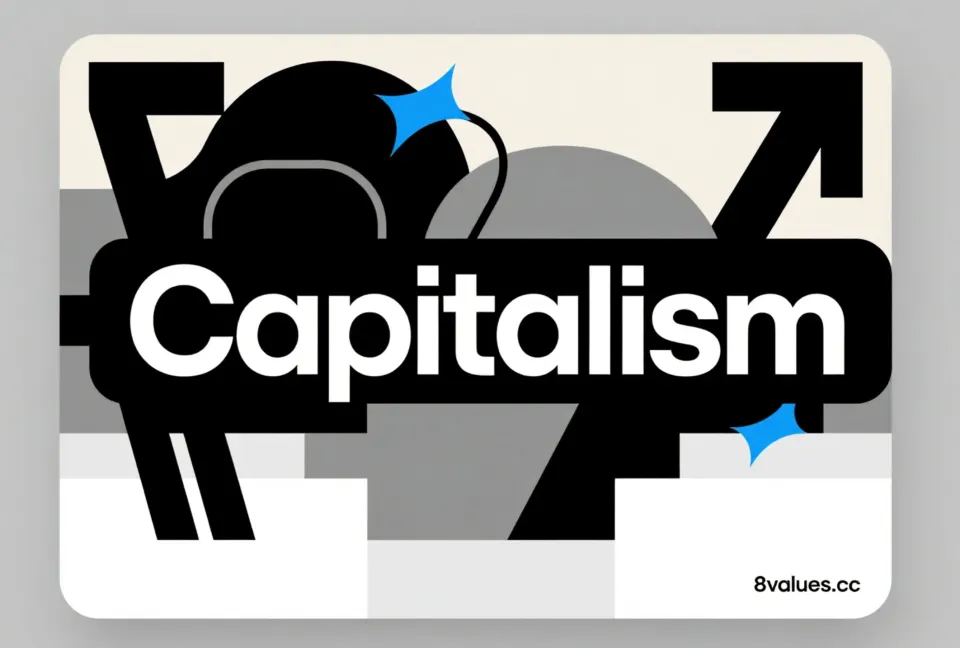Revolutionary Socialism | 8values Interpretation of ideological ideology of political tests
Explore the theoretical core, historical roots, main schools and their differences from reformism. This article will explain this proposal in detail the political philosophy of achieving fundamental changes in the social structure through social revolution, helping you better understand the ideological result of "revolutionary socialism" in the 8values political tendency test.
Revolutionary Socialism is an important political philosophy that emphasizes the realization of fundamental changes in the social structure through social revolution rather than gradual reform, and ultimately transitioning from capitalism to socialist mode of production. This school of thought believes that only by completely overturning the existing political and social system can we end the ruthless greed, competition and alienation brought about by capitalism, and realize a society where resources and wealth are shared, everyone is equal, and the full potential of human creation can be fully utilized. Unlike those reformism or social democracy that seek to gradually improve socio-economic problems within the existing capitalist framework, revolutionary socialism advocates a thorough and decisive change.
The Origin and Core Ideas of Revolutionary Socialism
The roots of revolutionary socialism can be traced back to the works of Karl Marx and Friedrich Engels in the mid-19th century. They believe that capitalism will inevitably perish due to its inherent contradictions, and the working class (the proletariat) will overthrow the capitalist class (the bourgeoisie) through a revolution and establish a socialist society.
The inevitability of class struggle and social change
The core of revolutionary socialism lies in its emphasis on Class Struggle. It believes that there is an irreconcilable fundamental conflict between the bourgeoisie and the proletariat in capitalist society. Marxists believe that the existing state mechanism is controlled by the class that controls capital and its operation is in the interests of a few people. Therefore, real change must come from outside the existing system.
Revolutionary socialists firmly believe that the Working Class is the decisive force in promoting social change. They have the ability to interrupt daily profit-seeking production and operate enterprises independently. Through Collective Ownership, the working class can control the means of production, eliminate class distinction, and end the phenomenon of human exploitation.
National, economy and human nature vision
In the vision of revolutionary socialism, the economy should be organized around human "needs" rather than "desire". In a system that eliminates class distinction and capital ownership division, all people have means of production, so there is no exploitation. Such an economic model will be self-regulated without state intervention.
Regarding the view of the State, revolutionary socialists believe that in the transition from capitalism to socialism, a transitional period of proletarian dictatorship of the Proletariat is needed. This period aims to reshape society and economy to achieve socialist goals and suppress the old ruling class. Ultimately, as society becomes classless and self-regulation is achieved, the state will gradually " extinct " and transform into "management of things" rather than "governance of people".
Regarding human nature , revolutionary socialist thought tends to believe that people have empathetic, community tendencies and sociable. Exploitation and crime are not caused by defects in human nature, but the consequences of social class distinction. By building a collective society based on empathy, self-regulation can be achieved and exploitation and crime can be eliminated.
Theoretical schools and representative figures of revolutionary socialism
Revolutionary socialism is a broad trend of thought, including a variety of political and social movements, and their definitions and implementation methods of "revolution" may vary.
Marxism and Leninism
- Marxism : Founded by Karl Marx and Friedrich Engels, it emphasizes the inevitability of historical materialism and proletarian revolution. They believe that in capitalist society, the working class is exploited and will eventually overthrow capitalism through revolution.
- Leninism : Vladimir Lenin developed Marxism and proposed the Vanguard Party theory. He believes that the revolution needs a pioneer party composed of intellectuals to guide the workers' masses that have not yet been fully politicized.
Trotskyism and Luxembourgism
- Trotskyism : Leon Trotsky was one of the key figures in the October Revolution. He advocated the "continuous revolution theory", emphasized that the socialist revolution needs to be carried out globally, and opposed Stalin's proposal to "build socialism with one country." Many Trotskyist groups still advocate revolutionary socialism today and oppose reformism.
- Luxemburgism : Founded by Rosa Luxemburg, she is known for her theory of "revolutionary spontaneity". Luxembourg believes that socialism must come from the active and conscious collective action of oppressed groups, rather than the alms of the political elite. She emphasized the importance of mass movements and democratic socialism, and advocated that socialism should coexist with freedom of thought and political diversity.
Other non-Marxist schools
Revolutionary socialism also includes some movements that are non-Marxist or are inspired by Marxism but are differentiated, such as:
- Anarchism : advocates the abolition of state and all hierarchies and realizes social revolution and workers' autonomy. Some anarchists, especially anarchists, also considered revolutionary socialists, but they advocated the direct abolition of the state rather than letting the state "death".
- Revolutionary Syndicalism : Trying to overthrow capitalism through workers' strikes and trade union movements, directly establishing a worker-controlled production mode to overthrow capitalism.
The fundamental difference between revolutionary socialism and reformism
The core dispute between revolutionary socialism and reformism (or social democracy) lies in the "means" of achieving socialism.
- Reformism : advocates achieving social improvement through democratic elections, parliamentary politics, social reform and gradual policy adjustments within the existing capitalist framework. For example, Bernie Sanders’s call for “political revolution” is more like a series of major reforms than a fundamental social revolution, in the eyes of Marxists. Reformists believe that the capitalist system can gradually evolve into socialism through internal reform.
- Revolutionary Socialism : It believes that capitalist countries are essentially dominated by capital interests and cannot achieve fundamental changes through internal reforms. They advocate destroying the capitalist system and building a whole new society through rapid and thorough institutional changes , often involving violence or large-scale mass movements.
Revolutionary socialists believe that reform alone cannot touch on the fundamental structure of capitalism, nor can they solve its inherent exploitation and inequality. Although reforms can bring about positive social changes, they will not fundamentally change the private ownership of means of production and the control of the state machinery by capital.
Historical Practice and Challenges of Revolutionary Socialism
Historically, revolutionary socialism has been practiced through several iconic events, but it also faces many challenges and controversies.
Iconic revolutionary practice
- Russian Revolution (1917) : The Bolsheviks, led by Vladimir Lenin, overthrew the Provisional Government and established the Soviet regime, the first successful practice of revolutionary socialism at the national level. This revolution aims to abolish capitalism and class distinction.
- Chinese Revolution (1949) : Under Mao Zedong's leadership, the Communist Party of China overthrew the Kuomintang government through long-term armed struggle, established the People's Republic of China, and implemented socialist policies such as land redistribution and nationalization of means of production.
- Cuban Revolution (1959) : Revolutionary forces led by Fidel Castro and Che Guevara overthrew the Batista dictatorship and established a socialist state characterized by public ownership.
The common feature of these revolutions is the overthrow of the existing ruling class, the establishment of the proletariat's control over the state, and the implementation of policies aimed at abolishing capitalism and class distinction.
Challenges and criticisms
Although the goal of revolutionary socialism is to achieve freedom and liberation, its historical practice has also caused a lot of controversy and criticism.
- Centralization and human rights issues : Some comments pointed out that the Soviet Union, under Stalin, led to authoritarianism and human rights violations. Marx's idea of the "death" of the country was not realized, but instead a highly centralized political system emerged.
- Economic Stagnation and Breach of Trust : Some historians believe that the Stalinist regime’s decades of repressive bureaucratic rule and mismanagement have led to economic stagnation and even regression, decline in workers’ living standards and shortage of basic goods. These so-called "communist dictatorships" use socialist terms to justify their misconduct, resulting in a damaged reputation among a large part of the global population.
- Question of Violence : Critics argue that the emphasis on revolutionary and class struggle by revolutionary socialism may lead to violence and oppression. However, revolutionary socialists believe that if violence occurs in the revolution, it is often because the capitalist ruling class adopts extreme violent means to safeguard its own interests. They also acknowledge that revolution can be achieved through large-scale mass movements and political struggles in non-armed conflict.
Revolutionary Socialism in the 21st Century
After the collapse of the Soviet Union at the end of the 20th century and the decline of the communist movement, the direct correlation of revolutionary socialism decreased. However, entering the 21st century, as global challenges such as cost-of-living crisis, war conflicts and climate change become increasingly severe, the openness to socialism and communism among the younger generation has risen.
Today, some organizations, such as "Revolutionary Socialism in the 21st Century, rs21" and "Socialist Alternative", are still active in the UK and around the world, continuing to promote the theory and practice of revolutionary socialism. They incorporated issues such as Eco-socialism, Feminism, Anti-racism and Anti-imperialism into the framework of revolutionary socialism, believing that these are integral parts of the capitalist crisis.
These modern revolutionary socialists stress that responding to global crises such as climate change requires a radical change in the way the economy works, which can only be based on socialism. They are committed to building a team of Marxists who understand the needs of systemic change and collaborate in the workplace, trade unions and various social movements.
Conclusion: Understanding Revolutionary Socialism
Revolutionary Socialism is a profound political philosophy that fundamentally criticizes capitalist society and provides a radical vision for building a more equal and just society. It advocates the overthrow of the existing class structure through a social revolution led by the proletariat, realize the collective ownership of the means of production, and ultimately achieve a classless and stateless communist society.
Although its historical practice is accompanied by complex challenges and controversy, its call for fundamental social change, its emphasis on class struggle and its vision for human liberation still occupies an important position in social movements and political discussions around the world. By understanding the diverse schools of revolutionary socialism and its core ideas, we can take a more comprehensive look at the socialist movements in history and have a deeper understanding of the challenges and paths of change faced by current society.
If you want to learn more about your own political inclinations, you are welcome to conduct the 8values political inclination test to explore more 8values all results ideologies like Revolutionary Socialism. Also, follow our official blog for more in-depth discussions and latest insights on political and philosophical topics.






